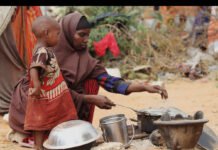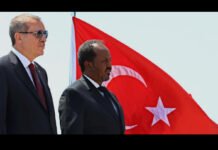By Horn Africa News
Ouagadougou – In a striking display of self-reliance, Burkina Faso’s Minister of Humanitarian Affairs, Passowende Kabre has announced that the country has now achieved 99% of its humanitarian assistance targets — a significant milestone reached without financial support from USAID, France, or other traditional Western donors.
This follows a February 2025 statement by Minister Kabré, in which she revealed that 91% of the ministry’s goals had already been accomplished independently. Speaking at a press briefing earlier this week, she confirmed that progress has now reached 99%, praising the resilience and unity of the Burkinabè people.
“We have demonstrated that sovereignty is not a slogan, but a practice,” said Kabre. “Our people are capable of facing crises and supporting one another — not through dependency, but through dignity and determination.”
Burkina Faso, often cited among the world’s poorest nations in global economic rankings, has struggled with ongoing security challenges, internal displacement, and climate-induced hardship. Despite these obstacles, the country has restructured its approach to humanitarian support, relying on local community networks, national resources, and partnerships with neighboring African nations and non-Western allies.
This achievement comes amid a broader continental conversation around post-colonial independence, aid dependency, and African-led development. Critics of Western aid systems argue that traditional models often create long-term reliance and undermine local governance.
The announcement has triggered debate across social and political circles in Africa and beyond. Many are asking: if a country like Burkina Faso — facing economic hardship and regional instability — can nearly meet its humanitarian goals on its own, what prevents wealthier and more stable nations from doing the same?
The case of Burkina Faso is likely to fuel growing calls across the Global South for self-determination, decolonization of aid, and investment in domestic capacity-building over foreign dependency.
As the continent redefines its path forward, Burkina Faso’s model may become a powerful symbol of what African nations can achieve when they turn inward for solutions — and outward for solidarity, not charity.




